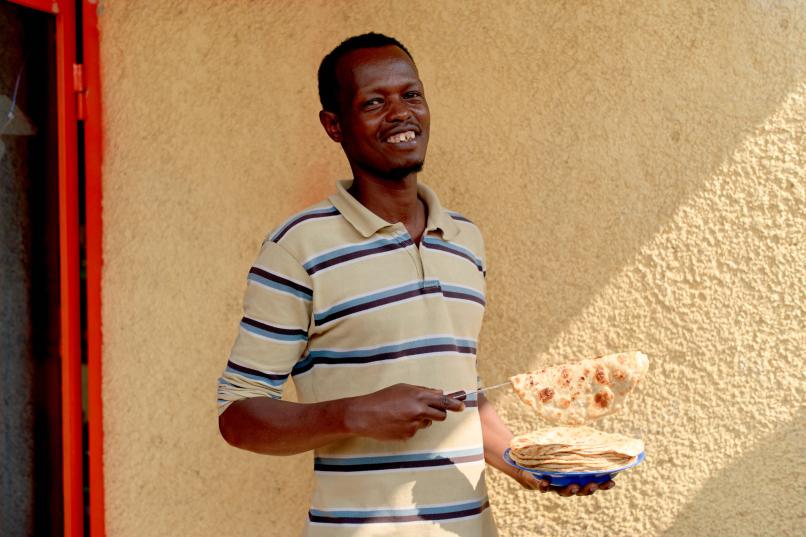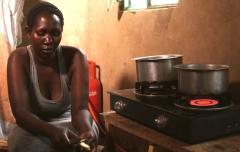Examining the potential for electric cooking in Rwanda
Cooking with firewood is harmful to peoples’ health and the environment, which is why the global push for clean cooking seeks to help people transition to less polluting cooking solutions.
According to the IEA, Rwanda ranks among the top 20 countries worldwide with the lowest percentage of the population with access to clean fuels and technologies. Approximately 93 percent of Rwandan households use biomass for cooking in the form of firewood (76 percent) and charcoal (17 percent), according to the 2022 Population and Housing Census of Rwanda.
A study developed by Sustainable Energy for All and its partners examined the potential for electric pressure cookers (EPCs) to replace these traditional, polluting cooking methods in Rwanda and inform government and industry efforts to promote the technology’s adoption.
The electric cooking (eCooking) study was a joint initiative between Nexleaf Analytics, Modern Energy Cooking Services, Electrocook, A2EI and Climate Solutions Consulting, with support from Swedish Postcode Foundation. It involved Electrocook providing 100 participants with EPCs as a replacement for the charcoal and/or LPG stoves they were previously using. Their experiences with the EPCs were tracked to assess several factors, including overall usage, cooking costs, time savings, changes to cooking habits, and more.
Key findings of the study are summarized in a report titled Examining the Experience of Using Electric Pressure Cookers in Urban Households in Kigali, Rwanda and show that the overall experience of cooking with an EPC, which was a new cooking appliance to nearly all participating households, was positive.
The study shows that transitioning to eCooking offers numerous advantages both within households and on a wider scale. Study participants appreciated the cleaner and more convenient cooking experience offered by the EPC, both in terms of the fuel preparation and the cooking process itself. For example, the median time taken to prepare a meal decreased from one hour 44 minutes in the baseline phase to one hour 30 minutes in the pilot phase, resulting in a time saving of nearly 15 minutes.For some food like vegetables, about 30 minutes can be saved and savings for cooking beans are even greater.
However, the study also revealed several key barriers to consumer uptake of EPCs. For example, participants commonly resorted to fuel stacking (using an additional cooking method), indicating the challenge of cooking multiple dishes in an EPC, especially given that only one pot was provided with the appliance. This finding emphasizes the need for a cooking appliance that can accommodate multiple dishes simultaneously and include multiple pots (whether as an extra item paid for upfront or in instalments, or as part of a set).
These types of insights are meant to guide the efforts of industry and government to support a transition to clean cooking. Additionally, the report highlights that it is crucial to overcome potential barriers to people buying and using appliances. These include the cost, the current lack of training and familiarity with how to use eCooking appliances, user-centric design considerations, shared household electricity meters, and lack of awareness on cost competitiveness of cooking with electricity as part of a cooking mix. By addressing these factors, households can be encouraged to move away from biomass and transition towards cleaner and more sustainable fuel alternatives.
Up until recently, cooking with electricity was not viewed as a viable clean cooking alternative in Rwanda and other low-middle income countries due to the relatively high cost and inefficiency of electric cooking appliances, low levels of electricity access, and high cost of electricity where connections are available. However, with the emergence of energy-efficient appliances such as EPCs and the increasing availability and improved reliability of electricity, particularly in urban centres, electric cooking has become an option for greater numbers of people.
Study findings were presented during a workshop in Kigali on 8 November involving representatives from the Rwandan government, development partners, researchers and local clean cooking companies. The EPC pilot dataset is integral to the electric cooking model in the Integrated Clean Cooking Planning Tool that is being used to develop the Rwanda National Integrated Clean Cooking Plan, which will be publicly accessible by all stakeholders within the clean cooking sector. This strategic initiative will, in turn, facilitate informed decision-making for both government agencies and private sector actors.


